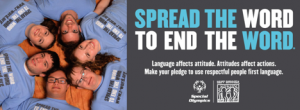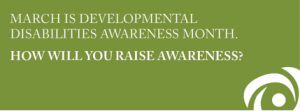March is Developmental Disabilities Awareness Month thanks to a 1987 Presidential Proclamation from Ronald Reagan. A lot has changed since then, more people with intellectual and developmental disabilities (I/DD) are living and thriving in their communities rather than institutions, there are more opportunities, more protections and more respect for and inclusion of people with I/DD in their communities.
Developmental Disabilities Awareness Month is time set aside each year to raise community awareness about the people with developmental disabilities. Developmental Disabilities is defined as a significant and lasting mental and/or physical impairment, a developmental disability occurs prior to age 22 and substantially limits a person in 3 or more major life activities. Learning, speaking, personal care, moving, hearing, making decisions and working are a few examples of major life activities. People with developmental disabilities are an important part of our community and have many gifts and talents to contribute.
People with disabilities are four to ten times more likely to be assaulted, robbed, or sexually attacked than people who are not disabled. One recent study found that more than 70 percent of women with developmental disabilities are sexually assaulted in their lifetimes, which represents a 50 percent higher rate than the rest of the population.
Why Celebrate It?Â
- To learn about an important group that is struggling for full inclusion in US society.
- To understand why laws were created to protect people with disabilities, and how they work.
- To appreciate the great and small contributions people with disabilities make to our society.
- To help improve attitudes and eliminate stereotypes that hold back people with disabilities.
- To learn to separate people from their disabilities, so accomplishments are recognized without an inappropriate focus on disability.
- To recognize that we are all just a heartbeat away from becoming disabled through illness or accidents.
What Can I Do?Â
- Learn about different disabilities and how they affect people differently: read, ask questions, and respect differences.
- Support the efforts of people with disabilities to lead full lives, work at rewarding jobs, and participate in all aspects of life.
- Correct and challenge stereotypes and slurs in media, advertising, and everyday conversation.
- Support local groups working for diverse multicultural institutions.
 On Wednesday, March 6, people around the world will unite their communities to Spread the Word to End the Word®, as supporters participate in the 5th annual ‘Spread the Word to End the Word’ awareness day, aimed at ending the hurtful use of the R-word (“retard(ed)â€) negatively impacting people with intellectual and developmental disabilities (IDD).
On Wednesday, March 6, people around the world will unite their communities to Spread the Word to End the Word®, as supporters participate in the 5th annual ‘Spread the Word to End the Word’ awareness day, aimed at ending the hurtful use of the R-word (“retard(ed)â€) negatively impacting people with intellectual and developmental disabilities (IDD).
Watch “Not Acceptable”, the R-Word PSA on YouTube.
Language affects attitudes. Attitudes impact actions. Special Olympics and Best Buddies International encourage people all over the world to pledge now to use respectful language at www.R-word.org and build communities of respect and inclusion for all people.


0 Responses
Stay in touch with the conversation, subscribe to the RSS feed for comments on this post.